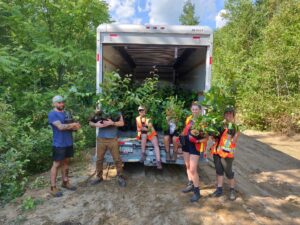
If you can believe it, spring is on the way!
We are seeking volunteers to help out at the Rotary Fish Traps (smelt wheels) on the Nashwaak this spring. This is an interesting experience and well worth your time.
Below is a description of what you can expect, as well as the dates for which volunteers are needed.
Please e-mail Peter Salonius petersalonius@hotmail.com or telephone him at (506) 459-6663 to let him know on which dates you might be available.
NOTE: You may not be needed on the day you have chosen if the operation is not going on due to high water or lack of fish in the days previous.
- Saturday, May 2
- Sunday, May 3
- Saturday, May 9
- Sunday, May 10
- Saturday, May 16
- Sunday, May 17
- MONDAY, May 18 (Victoria Day)
- Saturday, May 23
- Sunday, May 24
to set a time and place to meet. The tech will often pick you up at your residence on the way out to the smolt wheels that are just downstream from Durham Bridge, and drop you back at your residence when the work is completed.
The wheel(s) look like cement mixers with the big end facing upstream — the current makes the wheel rotate and downstream migrating fish are gently directed by the wheel’s rotation into a holding well at the downstream end of the unit.
You will travel by motor boat upriver to the smolt wheel that is guy-wired in the main current, and tie up the boat to the deck which is like a floating dock. The tech will do most of the operation (clearing debris from the wheel and fish well, netting the fish and depositing them in buckets in the boat). The tech will need you to tally the salmon smolts as WILD or HATCHERY ORIGIN in groups of five, as well as marking down other species and their sizes —- all on waterproof paper in a log book.
Once back on shore the retained fish in buckets will be anesthetized, measured, weighed and have a scale sample removed for later analysis to determine how many years they have been in the river since hatching from the egg — here again you will be making entries in the log book and marking lengths and weights on sample envelopes into which the glass slides with the scales are deposited. A certain number of the fish will have a small part of their fleshy adipose fin removed / clipped off— which is an operation requiring both you and the tech.
At the end of the morning, the clipped fish will be taken several kilometers upstream and placed back in the river. The proportion of these fish that are recaptured on subsequent days will indicate how much of the total population is being captured by the wheel(s) so that the total number of juveniles migrating toward the ocean can be estimated at the end of the season.
DFO operates an adult fish counting fence in the same location during the summer — so that the numbers of salmon returning from the ocean can be compared to the smolt numbers that migrated to the ocean /// this measure gives an indication of marine survival.
The Nashwaak is used as the INDEX river for all salmon streams downstream fro the Mactaquac dam.

